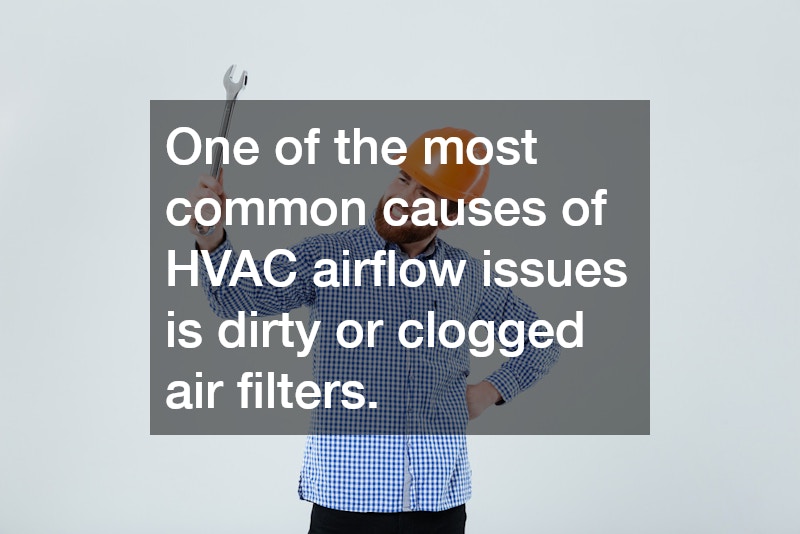Heating, Ventilation, and Air Conditioning (HVAC) systems play a critical role in maintaining indoor comfort and air quality. However, airflow issues can arise and significantly affect the efficiency and effectiveness of your HVAC system. Understanding the root causes of these issues is essential for maintaining a comfortable and healthy indoor environment.
Dirty or Clogged Air Filters
One of the most common causes of HVAC airflow issues is dirty or clogged air filters. These filters are designed to capture dust, pollen, and other particles to improve indoor air quality.
However, when they are not replaced regularly, these particles can build up and restrict airflow through the system. This not only reduces the efficiency of your HVAC system but can also lead to further mechanical issues if not addressed promptly. Regular maintenance by professional HVAC contractors ensures that air filters are replaced in a timely manner, maintaining optimal air quality and system performance.
Besides impacting airflow, dirty air filters can cause the HVAC system to work harder than necessary. This increased effort can result in higher energy bills and potential overheating of system components, leading to unexpected breakdowns. Over time, the strain on the system can shorten its overall lifespan, necessitating costly repairs or replacements. Regularly changing air filters can prevent these problems, but many homeowners overlook or forget this simple maintenance task. Engaging HVAC contractors for routine inspections can help you keep on track with essential maintenance practices.
In addition, dirty filters may contribute to poor indoor air quality, affecting the health of the building’s occupants. When an HVAC system’s airflow is restricted, it becomes less effective at circulating fresh air, which can lead to an accumulation of pollutants indoors. This situation is particularly concerning for individuals with allergies or respiratory issues, as it can worsen their symptoms. Professional HVAC contractors can advise on the best filters for your system, ensuring both effective airflow and excellent air quality. Regular evaluations and maintenance are key to extending the life and efficiency of your HVAC systems.
Blocked or Leaking Ductwork
Blocked or leaking ductwork can significantly impede the performance of an HVAC system. When ducts are obstructed, airflow throughout the building is uneven and can result in some areas being significantly cooler or warmer than others. Common causes of duct blockages include debris, dust accumulation, or even pests nesting within the duct system. Leaks, on the other hand, allow conditioned air to escape before it reaches its destination, leading to inefficient heating or cooling. HVAC contractors can inspect and repair ductwork, ensuring that the system operates efficiently and without interruption.
Leaks in ductwork are often difficult to detect without professional assistance. A small gap or hole can lead to substantial energy loss, increasing utility costs and straining the system as it compensates for the lost air. The age and original installation quality of the ductwork play significant roles in airflow efficiency. Even newer systems can suffer from poorly installed seams or connections, resulting in airflow disruption. Regular inspections by HVAC contractors can identify and repair these issues before they become major problems.
A comprehensive evaluation of the ductwork can also reveal areas that may benefit from sealing and insulation. Sealed ducts ensure that air moves efficiently through the system, while proper insulation prevents energy loss as air travels through unconditioned spaces like attics or crawlspaces. These measures can bolster the overall performance of your HVAC system, saving money and enhancing comfort. Skilled HVAC contractors have the tools and knowledge to assess, seal, and insulate ductwork efficiently, improving airflow and system reliability.
Improperly Sized HVAC Equipment
Improperly sized HVAC systems can lead to a myriad of airflow problems. If the system is too large for the space it serves, it may cool or heat the area too quickly, leading to short cycling. This frequent turning on and off can cause problems for airflow, as it doesn’t allow for adequate distribution of air throughout the building. Conversely, a system that is too small will struggle to maintain the desired temperature, running continuously and failing to achieve efficient airflow. Engaging with experienced HVAC contractors for a proper load calculation ensures the equipment is appropriately sized for the space it serves.
Short cycling can also contribute to increased wear and tear on HVAC components. The constant stopping and starting create stress on the system, potentially leading to premature failure. This situation not only impacts airflow but can also elevate repair costs and reduce system lifespan. A properly sized system ensures even distribution of airflow and maintains indoor comfort. Professional HVAC contractors can assess and recommend the best equipment for your specific needs, balancing energy efficiency and performance.
An HVAC system that operates seamlessly not only provides consistent temperatures but also optimizes energy consumption. Proper sizing takes into account numerous factors, including the layout of the space, insulation levels, and climate conditions. Even if an existing system is functioning, subtle airflow inefficiencies may be costing more than necessary due to improper sizing. Investing in consultation from HVAC contractors guarantees that your system is proportionate and effectively meets the demands of your home or business environment.
Addressing HVAC airflow issues is critical to ensuring the efficiency, effectiveness, and longevity of your system. Whether it involves changing air filters, inspecting ductwork, or sizing equipment correctly, maintaining good airflow ensures optimal indoor comfort and air quality. Working with professional HVAC contractors provides the expertise needed to diagnose and resolve these common issues effectively. Regular maintenance and evaluations are essential to preventing the problems that can strain an HVAC system, incur unnecessary costs, and reduce air quality. By understanding and addressing the causes of airflow problems, homeowners and businesses can enjoy a reliable and energy-efficient HVAC system year-round.



